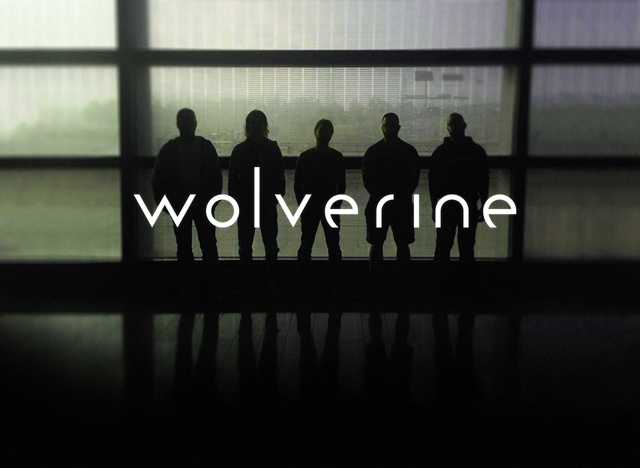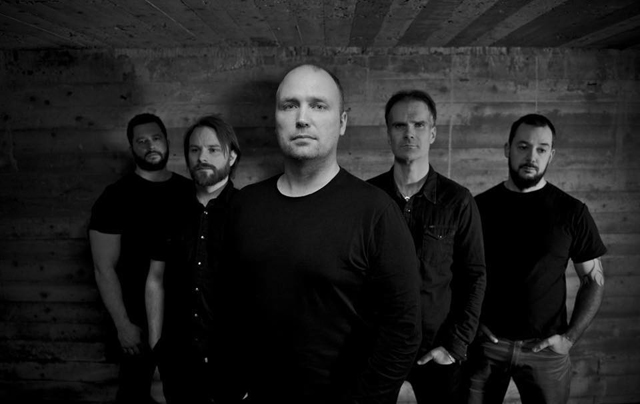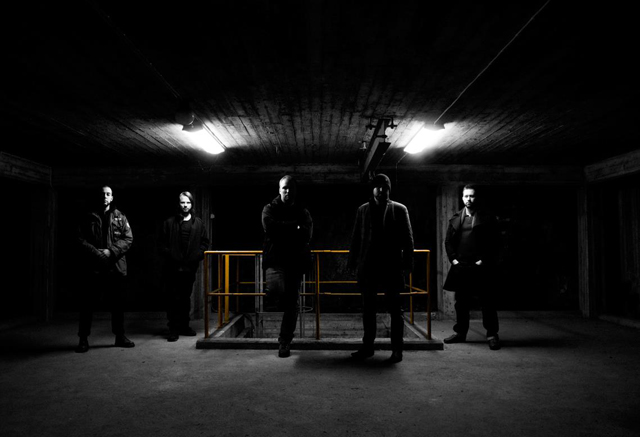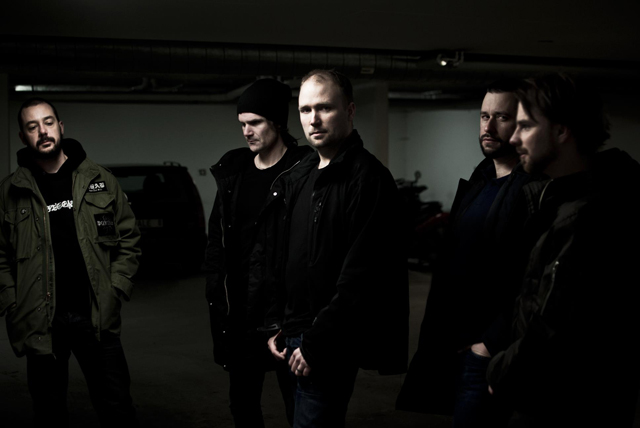
In 2016 Swedish progressive band Wolverine recently released their fifth album “Viva Machina” and performed for the sixth time at ProgPower Europe. Intrigued about what motivates this band, Andrew Doherty interviewed vocalist Stefan Zell (SZ) and drummer Marcus Losbjer (ML).
AN: Hello! Thank you first of all for agreeing to this interview. As you already know, I very much appreciated your performance at ProgPower Europe 2016, when you sent shivers down my spine with your atmospheric music and sensitivity. Your songs have a wistful quality, both musically and lyrically. One of my fellow spectators commented on your music being a cleansing process. Is this how you see it?
SZ: Thanks a lot! For me our music is definitely cleansing. I’m not necessarily talking about listening to it but rather writing it. Pretty much all our lyrics are stories that we lived through in real life. To me, composing our music has always been somewhat therapeutic and of course playing the songs live could also be described as cleansing. I always feel really great after a show, having had the opportunity to sing to people who like our material.
ML: Thank you! Playing music in general can be a sort of cleansing I guess. I don’t listen to a lot of music at home so as regards listening to music being a cleansing I wouldn’t be the right person to answer that.
AN: I think one of the things which attracts me to your music is that it is so real, yet there seem to be many reflections on life situations which don’t seem to be right or haven’t actually happened. I don’t see any element of fantasy at all, but rather conversations about fragile relationships, alienation and apparent hopelessness. Is that a fair interpretation?
SZ: As I said, most of our lyrics are about stuff we’ve been through ourselves. I like it when you describe the lyrics as “real” because that’s exactly the feeling I’m after. I don’t like to write about fantasy or fiction at all. I like to think that the listener can relate to what we write about since most stuff the lyrics talk about are stuff that most of us will have to deal with at one point or another.

AN: Often when I listen to your music, I am reminded of my favourite English author Alan Bennett, who looks in at the world from the outside. Sometimes he is inside the story and reflecting on events and relationships. At other times he is observing the other side. I also see a touch of Strindberg in your work, but not as extreme. Do you consider that you have particular literary, or of course musical influences for your work?
SZ: That’s really interesting to hear. However, I’m not inspired by any author or artist when it comes to the lyrics. However, when it comes to vocal melodies there are tons of inspirational sources to pour from. Everything from Bee Gees to Elvis to Richard Marx to Kiss to Queensrÿche to… the list goes on and on.
AN: I like the fact that at ProgPower Europe in 2016 and on previous occasions I have seen you live, you played a range of songs from your musical catalogue. Some bands would just reject their past and move on to the new. I guess part of this is playing what the audience wants to hear, but I sensed that you had carefully chosen the material for ProgPower Europe with a view to mood shift rather than presenting a chronological catalogue. Or it could be something more mundane than that. What factors went into the songs you chose for this setlist?
ML: I look at a setlist like a sort of wave, trying to get a flow and harmony between the songs. This time we started a bit mellow and then raised the intensity gradually, took it down and built it up again until the end.
AN: The other day I happened to come across on an old label sampler the song “Towards Loss” off your 2001 album “The Window Purpose”. It’s much harsher in its tone than recent works. How do you think you have developed musically since you started out as a band?
ML: When listening to our first demos, EP and then our first album there’s a lot of evolution there already. It’s a lot of exploring different things, sometimes it turned out better, sometimes it turned out worse. I can hear a kind of youthful naivety in it. It is a growing phase that I guess that every band goes through and I hope we will never stop growing. I think the songwriting now have become more subdued but more sophisticated and complex at the same time.
AN: You’ve been making music and, like all of us, building your life experiences for a long time now. How much change, self-awareness and self-confidence do you have now compared to when Wolverine started as a band in the mid 1990s?
SZ: We’re definitely, as individuals, in very different positions today compared to when we started the band more than 20 years ago. Back then we had the hunger to really “make it” as a band. We wanted to make our living off our music and it was a really exciting hunt going on for that thing to happen. Back then we didn’t have much else to focus on. Obviously that goal of living off the music was never achieved but I certainly do not look at that as a failure. We’ve gotten to achieve pretty much every other dream we had within the band, like releasing multiple albums and playing in front of audiences across the world. Today, all of us work or have families that we devote pretty much all our time to. Although we may not have that initial hunger “to make it” anymore I think we’ve managed to keep our hunger for writing music and
exploring our musical boundaries and that means the world to me. I’m so happy that we managed to keep the band together for so long. Writing music is still a big part of me being able to live a happy and good life. Not having that drive to live off the music also means we can put a lot of time and effort into writing the music we love. We don’t have to please anyone else but us. In the end I think that’s a winning concept. Having said that, after putting a lot of effort into the writing it’s always amazing to get out and perform the material live. We haven’t played live nearly as much as I’d like but hopefully we’ll get out a bit more often in the future now that we, for the first time in 20 years, have a proper management and booking representation.

AN: There’s an inescapable sense of real life in all your songs. What is the trigger or inspiration for a Wolverine song? Do you all go round with note books, and then observe and shape your thoughts, or is it more natural and organic than that?
SZ: I can only speak for myself and the writing of my lyrics. To me it’s always been very natural and I have never had to go around and collect ideas. Life offers so much, in the past years even a bit too much for my taste, in terms of stuff to write about. Of course there are a lot of amazing stuff happening in my life as well but the music the guys come up with often tend to lend itself better to the more dark stuff I’ve experienced. That’s all fine since it’s the dark stuff I feel good writing about. Having the band and the possibility to vent when writing lyrics really puts me in a very good place and makes it possible for me to enjoy all the positives in life in a more full way.
AN: When composing a Wolverine song, what is the typical process? Do you set out the instrumental pattern, add lyrics and make instrumental adjustments to capture the mood, or is it done in a different way?
ML: Usually it starts with a musical idea. It can be a chord progression, a riff, a
melody or just a groove. Per and myself try to put together a first draft/sketch, we usually send stuff to each other back and forth until we have something that we feel is worth presenting to the rest of the band. Then after the ideas have been tweaked with inputs from the rest of the band we may have something ready for Stefan to write lyrics for. After that we may have more changes and so on, it goes back and forth.
AN: At what point can you say that you are satisfied with a song, and it’s complete? Can you give an example of this?
SZ: In a way, they’re never complete. With a lot of our songs we’ve changed things around when playing them live. They kind of live on and evolve. When it comes to recordings there are usually a deadline set that tells us that it’s time to settle with the songs. We do however try to make sure that everyone in the band like all the material we record. When a song reaches that stage, and that may take a while, there are usually only minor details left until we feel we’re ready to record. The songs also change around a bit during the actual recording and mixing.
ML: The songs are usually not complete until they’re at the final stages of mixing.
AN: On stage, I observe an interesting band dynamic. You appear to project different personalities but as a band you’ve been quite stable in terms of line-up changes. Do you think these factors have an influence on the creative process when composing your songs?
ML: We are completely different people, usually five opinions about everything. It’s sometimes very draining but it’s also a good thing. We’re like a huge filter where the compromises between us are the final result.
AN: I sense no anger, just calmness in your work? Is this a reflection of your
personalities, Swedishness or just resignation?
SZ: Some songs certainly have some anger in them, like for example “A House of Plague” off the album “Still”. However, I’d say I’m not an angry person in general. I’m actually very content with life in general at the same time as I tend to reflect a lot about negative stuff I go through. I guess you could say that my way of dealing with the bad stuff in life is through reflection rather than anger. If that’s typical Swedish or not, I do not know.
AN: Sometimes I wonder if there’s any hope at all when I hear your songs. “Pile of Ash” makes me think this. The only ray of hope I get is from the beauty and form or your music, and clarity of expression, but not the content. Are there any strands of hope in your music?
SZ: Actually, “Pile of Ash” has a lot of hope in it. It deals with how we tend to totally burn out when a relationship comes to an end but that we, most of the times, will rebuild ourselves and move on just fine. I know a lot of people do not sense any hope in our lyrics but I have to disagree. Sure, some of the songs are pretty resigned in their tone but there sure are songs that bring some hope into the fold.

AN: I have always been struck by your talent for creating killer lyrical images, which stick in my mind and are almost leitmotifs. “There’s no way out of this”, “Why wouldn’t you save me”, “Just when she thought that things couldn’t get any worse” “Tonight I’ll be there by my window, watching the people below, so many stories of sorrow, so many endings to know”. It’s almost as if you play with time and space. Are you aware of the impact of certain lyrics in your songs?
SZ: I’m glad you think that way. I’d like to think of my own lyrics as some sort of “everyday lyricism” so to speak and find images many people can relate to and try to translate them into words. Maybe that’s what you’re picking up on? I also have to point out that I do not write all the lyrics. Marcus has written a lot as well and Thomas has contributed as well. They have a very different approach than me but I hope we kind of broaden the palette a bit by contributing with different styles.
AN: Your 2011 album “Communication Lost” completely blew me away. It’s much funkier and immediately accessible than the others. Was there a conscious switch in style when you put this album together?
ML: As with everything we have done, it has never been conscious. Our music is always a reflection of where we are as human beings, I guess.
SZ: Like Marcus says, we’ve never written and aimed our music in a conscious direction so to speak. We just go with the flow. To be honest, I didn’t think we’d get that album together at all. We were pretty much falling apart at the time so that kind of makes the achievement of putting that album out even greater. I never looked at it however as more accessible. “Still” has always been the album I’ve looked upon as most accessible among our albums. We did however pretty soon realize that the album had quite some impact on a lot of people judging from the reactions we saw.
AN: “Machina Viva” has a different, more gentle and more symphonic feel compared to “Communication Lost”. For me, there is more indulgence on “Machina Viva” than perhaps on previous albums. As a case in point, “Nemesis” is like a dream, with all your instrumentalists creating a luxurious misty world. I confess that once I’d got over the fact that it’s not “Communication Lost”, it has still taken me a little time to start to
fully appreciate its immense sophistication. What were you seeking to convey when you set out to create “Machina Viva”?
ML: I wanted to explore the more stripped down contra the more complex. The electronic/machine-like contra the more organic/acoustic. Communication Lost was more one-dimensional in a way. In my view Machina Viva has a more sonic diversity to it. Maybe it’s “calmer” but it’s more going on under the surface I believe.
AN: Symphonic arrangements are not completely new for you, but I was more
aware of them on “Machina Viva”. The French horn on “Bedlam Overture” and “Our Last Goodbye” enhances the already melancholic mood. The cello version of “Pile of Ash” is like a devastatingly sad hymn. Do you think you might incorporate more symphonic arrangements in future, or are you looking at a different direction?
ML: We are always evolving, both as musicians and as individuals. I don’t think we have ever aimed for a certain direction, the music has always just become what we have felt like writing at the moment. Since I love to explore different sounds and textures, and cello is one of the most beautiful sounding instruments in my opinion, it is only natural to incorporate that into our music.
AN: What’s “Bedlam Overture” about? As I listen to it, I hear silky, calming patterns with hints of troubled waters, but not the bedlam, screaming words and raging fire which are contained in the title and lyrics.

ML: The title actually came from the first demo I did for this song. At that time it had a lot of the elements that the final version has but it was originally instrumental and it had a lot more layers and stuff going on that made it a bit more chaotic in nature. As time and years progressed, since I did the first demos of this back in 2006 already, it evolved into something far bigger and lengthier than it was originally intended to be. The title always stuck with me and when it was time to start thinking about lyrics I suggested to Stefan to try to write “something about the current state of humanity” or something like that. I guess the title is more lyrically than musically at this point, and
since the vocals only kick in after about 3 minutes into the song, I thought that it would be a great introduction to the album hence the “Overture” part.
SZ: Like Marcus says it’s an envisagement of the current state of the world, or rather some aspects of it. Aspects that to me are insane. How media dictates how people, and especially young people, shall live their lives, how certain powers in 2016 still can’t accept people that fall in love with someone of their own gender, how the tide of xenophobia nurtures racism and far-right politics… the list goes on.
AN: You have mentioned to me that there may be a tour in 2017. Do you have any details of that yet?
ML: It’s still in the planning, but as it looks at the moment, the tour will start in London at the 21st of April and go through Northern Europe and end in Sweden around the 6th of May.
AN: Do you have any further projects in progress at present or other ideas you would like to develop?
SZ: Right now we’re focusing on getting a good live set together for the tour but also at writing new material. It would be nice to not have five years pass before our next album.
AN: And finally, is there anything you’d like to say to readers of Ave Noctum?
SZ: Thank you for your support! We hope you like the new album and that we get to see you if the tour takes place next year as planned!
ML: Thank you for all the support. If you want to support small bands like us you should buy the music and come out to our gigs, it’s the only way these days. You can obviously find Machina Viva on all streaming services but if you really want to support the band you can find and buy our album at: https://lasersedge.bandcamp.com or https://www.lasercd.com
AN: Thank you once again! I very much look forward to seeing you live again, so hopefully that will happen soon, and in the meantime will continue to enjoy absorbing “Machina Viva” and your other albums. All the best to you and your fellow band members, and good luck for the future in all your projects!
SZ: Thank you very much, Andrew!
(Andrew Doherty)

Leave a Reply